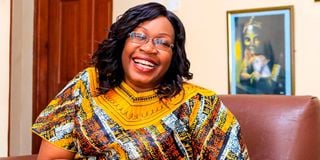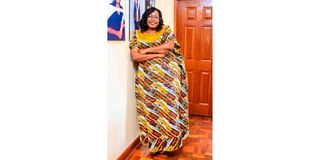Premium
Betty Adera: Serving communities at the grassroots enriches my life

Betty Adera is the founder of the Betty Adera Foundation, which collaborates with grassroots women and youth to champion girls' education, gender equality, and equity, as well as challenge all forms of gender-based violence.
What you need to know:
- Betty Adera , is the Global Senior Technical Advisor for HIV/Aids, Health, and Nutrition at Global Communities, backstopping programmes in Africa, Asia, the Middle East, and Latin America.
- She is also an actor in the Health Policy space within Maternal Child Health and Nutrition and Reproductive Health, having served in numerous National-level health-related technical working groups.
When we are ushered into Betty Adera’s home in Nairobi’s Loresho area, one thing immediately catches my attention - the documentation of memoirs and experiences through art, drawings and photos. Her walls are a museum of sorts.
Among other things, Ms Adera is a Global Public Health and Policy Specialist with over 22 years of Senior Management experience in both local and international NGOs. Currently, she is the Global Senior Technical Advisor for HIV/Aids, Health, and Nutrition at Global Communities, backstopping programmes in Africa, Asia, the Middle East, and Latin America.
She is also the founder of the Betty Adera Foundation, which collaborates with grassroots women and youth to champion girls' education, gender equality, and equity, as well as challenge all forms of gender-based violence.
Are you an artist or just a collector?
Well, I am not an artist myself, but my last-born son is so good at drawings. Some of his drawings are on these walls. But I am a collector, and that adds to the colour, life, and vibrance of our home. Whenever I travel to another country, which I do a lot, I must bring back a souvenir from that land and add it to the collection.
Speaking of travelling, you are currently in charge of four continents; how do you manage?
My role means working across several timelines. While I mostly operate from here in Nairobi, it also means that I have to ensure I am not falling behind on my deliverables, so it is not unusual for you to catch me at a work meeting at 3 am.
Where did your journey begin?
I grew up in a village called Wouth Ogik in Migori County. Wuoth Ogik in Dholuo means the “end of the journey or mwisho wa safari”. Coming from such a place if you are not careful, that name can easily define you. I had a normal childhood as the sixth of eight siblings born to teachers. This meant the discipline bar was set very high for us. My parents were disciplinarians, and some of the values they instilled in us, such as hard work, have stuck with me to this day and I instil the same in my sons. I especially remember my dad urging us all to study hard, as education was and still is the equalizer for all. He would be so proud to learn that by God’s grace, I am set to graduate with a PhD in Global Public Health from EUCLID University at some point this year.
What kind of sibling were you?
I was the snitch! I laugh when I remember this! I am the one who would always tell on my siblings to my dad and get them caned thoroughly. I had a great relationship with my dad. He passed away in 1986, but the memories I shared with him are just as fresh in my mind today. I am the only one who used to make his fried eggs - he loved my cooking, though I was very young. Though I got into trouble with my siblings for snitching, they would also use me if they needed anything from him, as he would hardly say no to me. So, it's sort of balanced.
How did you choose your career path?
I loved studying and was an equally bright student. I went to Migori Primary School, then qualified for Kenya High School, and later transitioned to the University of Nairobi (UoN), where I acquired a Bachelor's degree in Arts and Social Work and graduated in 1997. It was at the University of Nairobi that I knew I wanted to be a community-level person—a grassroots empowerment kind of person. By this time, I was married and a mother of one.
We then moved to Homabay Town, and because I did not want to sit idle after graduation, I approached a local high school in search of a teaching job. I approached the head teacher then and told him that I had no teaching qualifications by any standards, but I spoke good English. I was able to convince him and that is how I got my first job, earning Sh7,000. Looking back, the lesson I take away from this experience is do not despise humble beginnings; start somewhere and grow from there.

Ms Betty Adera is a Global Public Health and Policy Specialist with over 22 years of Senior Management experience in both local and international NGOs.
How has the journey been?
Well, from my brief teaching experience, I moved into the core of development work, prioritising community-driven interventions in the health research and development spaces, coupled with supporting children and households made vulnerable by HIV/Aids/TB, mainly in Kenya and across several other African countries at Management levels.
I am also an actor in the Health Policy space within Maternal Child Health and Nutrition and Reproductive Health, having served in numerous National-level health-related technical working groups. These experiences have laid a strong foundation for my career trajectory, reflecting and learning every day and building into the specialist that I am today.
You are the recipient of several awards. Which one stands out the most for you?
(Rising up and carefully picking up one award from her trophy display.) This one is right here! It is the converted CEO’s award awarded to me by Global Communities in 2018. At that time, every two years, the CEO of the organisation would just decide whom to give the CEO Award of the Year. For the first time, the award came to Africa. I became the first African and first African Woman to win this award. It was and still is one of the greatest honours of my career life.
What was the motivation behind founding the Betty Adera Foundation?
I founded the foundation in 2017 because of two main things: I saw the need in the community and many people were coming to me with concerns about how to address Gender-based Violence (GBV), and secondly, due to my lived experiences. I took a step of faith and put together the initiative. So far, we have helped over 3,000 survivors of SGBV and GBV. Looking back, I wish I had started that foundation much earlier.
What are some of the lessons that you have picked along the way?
Being a woman in leadership is not easy. You have to work twice as hard to prove that you are capable of fulfilling your responsibilities. While this has been a challenge, I have learnt to be my cheerleader and a believer in my voice. That way, I can confidently defend my thoughts and what I believe in. I have also come to appreciate the power of being kind and giving back. I have come to learn that giving comes with so much satisfaction and blessings.
What does the future look like for you?
I hope to have my Doctorate thesis published and I would also like to author books going forward. I am currently 50 years old and I am soon going to be an empty nester, so I also have plans to take on superfoods farming and put up a mental wellness centre to respond to the unique needs of adolescents and young people.
What’s your favourite meal to eat and make?
I love ugali. I can have ugali with no accompaniment. When I travel outside Kenya, I tell my sons to make sure they have prepared ugali before coming to pick me up from the airport. Chapatis are my favourite to make and I make really good ones, though I am not a fan of eating them. Even when we go to the village for Christmas or a family gathering, cooking chapatis is always left to me. I am fast and I make a lot of them in an incredibly short time.





